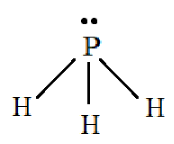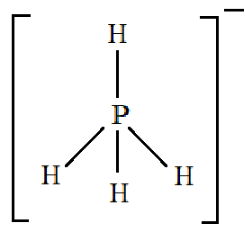Question
Question: What is the hybridization of the central metal atom in the following: \(P{H_3},P{H_4}^ + \)...
What is the hybridization of the central metal atom in the following: PH3,PH4+
Solution
We know that Hybridization involves the mixing of atomic orbitals of an atom (generally a central atom) to generate a new set of atomic orbitals which is called the hybrid orbitals. Hence to find the hybridization of the central metal atom we need to first write the electronic configuration and then draw the orbitals in which the bonded atom will be filled.
Complete step-by-step answer: The atomic number of phosphorous is 15 hence its electronic configuration will be: 1s22s22p63s23p3
Here the valence orbitals will take part in hybridization i.e. 3s23p3
So, for PH3
The orbitals will be filled as
↑↓
$3s$
| ↑ | ↑ | ↑ |
|---|
$3p$
Here the two electrons in 3sorbital are the lone pair of electrons present on phosphorus and the three hydrogen atoms are filled in the 3p orbital. Ideally the molecule should show sp3 hybridization but this does not happen. PH3 will not show any hybridization as it is considered to be a Drago molecule. Drago molecules do not have any hybridization and have the least bond angle. The geometry will be that of a trigonal pyramidal because there exists a lone pair-bond pair repulsion.
Structure of PH3:

For PH4+:
↑
3s
| ↑ | ↑ | ↑ |
|---|
$3p$
Here we see that since four atoms of hydrogen are present so it will occupy the 3s orbital as well as the 3p orbital. So, all the four sub orbitals are bonded with hydrogen atoms hence the hybridization will be sp3 and hence it will have a geometry of tetrahedral.
Structure of PH4+:

Note: To understand the Drago molecule you need to understand the Drago’s rule. The rule states that hybridization will not take place if:
1.The central atom belongs to the third or higher period.
2.The central atom possesses a lone pair of electrons.
3.The electronegativity of the terminal atom is less than the carbon atom.
